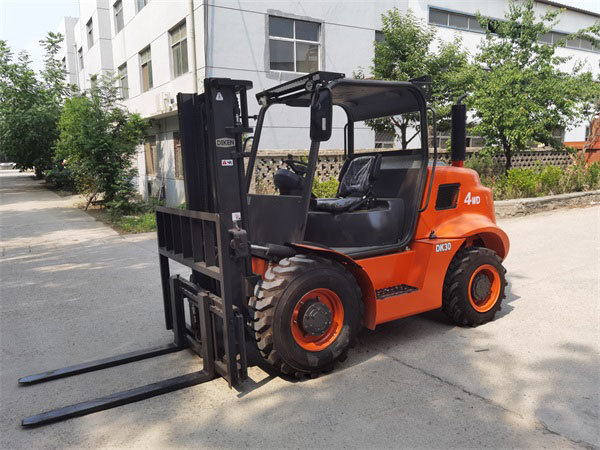Diken news
How to Choose the Right 2.5 Ton Rough Terrain Forklift for Your Farm
Release time: 2025-06-04
How to Choose the Right 2.5 Ton Rough Terrain Forklift for Your Farm
Table of Contents
- Understanding Rough Terrain Forklifts
- Why Choose a 2.5 Ton Forklift for Agricultural Use?
- Key Features to Consider When Choosing a Forklift
- Evaluating Your Farm Needs
- Top Brands and Models of 2.5 Ton Forklifts
- Safety Considerations for Operating Your Forklift
- Maintenance and Care for Your Forklift
- Frequently Asked Questions
- Conclusion
Understanding Rough Terrain Forklifts
Rough terrain forklifts are specifically designed to operate in challenging outdoor environments, making them ideal for agricultural settings. They feature larger tires, enhanced suspension systems, and powerful engines that enable them to navigate uneven surfaces. These forklifts are indispensable on farms where various materials, such as feed, equipment, and produce, need to be transported across rugged terrain.
Why Choose a 2.5 Ton Forklift for Agricultural Use?
A **2.5-ton rough terrain forklift** strikes an excellent balance between size and power, making it suitable for various farming tasks. Here are some compelling reasons to select a 2.5-ton model:
1. Versatile Load Capacity
The 2.5-ton capacity allows for efficient handling of moderate loads, such as bales of hay, pallets of seeds, or crates of produce. This weight capacity is sufficient for most farming applications without compromising maneuverability.
2. Enhanced Mobility
These forklifts are built to traverse rough landscapes, making them perfect for farms with uneven ground, mud, or other obstacles. Their design ensures that you can access hard-to-reach areas without difficulty.
3. Cost-Effective Solution
Compared to larger models, a 2.5-ton forklift typically costs less in terms of both purchase price and operational expenses. This makes it an attractive option for farmers looking to optimize their budget while still meeting their lifting needs.
Key Features to Consider When Choosing a Forklift
Selecting the right forklift involves careful consideration of several features. Here are some critical aspects to evaluate:
1. Engine Power and Performance
Look for a forklift with a robust engine that provides sufficient power for your tasks. Consider the type of fuel it uses—diesel engines are common for their durability and efficiency in heavy-duty applications.
2. Tire Type and Size
The tires should be designed for rough terrain, providing good traction and stability. Larger, wider tires are preferable as they distribute weight better and help prevent sinking into soft ground.
3. Lift Height and Reach
Evaluate the maximum lift height and reach of the forklift. Depending on your operations, you may need to stack materials or reach high storage areas.
4. Visibility and Comfort
A good operator's cabin design enhances visibility and comfort during use. Look for features such as adjustable seating, ergonomic controls, and expansive windows.
5. Weight and Stability
Ensure the forklift has a low center of gravity to enhance stability. This feature is vital for safe operations on uneven terrain.
Evaluating Your Farm Needs
Before purchasing a 2.5-ton rough terrain forklift, it’s essential to assess your specific farm needs. Consider the following:
1. Types of Materials to Handle
Identify the types of materials you will be lifting and transporting. This can influence the design features you prioritize in your forklift selection.
2. Terrain Conditions
Take note of the terrain conditions on your farm. If you have particularly rugged areas, a more robust model might be necessary, even if it exceeds 2.5 tons.
3. Frequency of Use
Consider how often you will use the forklift. If it will be a daily workhorse, investing in a higher-quality model with desirable features is worthwhile.
4. Budget Constraints
Establish a budget that accommodates not just the purchase price but also ongoing maintenance and operational costs.
Top Brands and Models of 2.5 Ton Forklifts
Several reputable brands manufacture 2.5-ton rough terrain forklifts. Here are some top contenders:
1. JCB
JCB is known for its durable and versatile machinery. Their rough terrain forklifts often come with excellent stability features and powerful engines.
2. Caterpillar
Caterpillar’s forklifts are recognized for their reliability and performance in harsh conditions. Their models often include advanced safety features.
3. Manitou
Manitou specializes in rough terrain handling equipment. Their forklifts are built for agility and ease of use, ideal for agricultural settings.
4. Bobcat
Bobcat forklifts are compact and maneuverable, making them suitable for smaller farms with tight spaces while maintaining robust performance.
5. Hyundai
Hyundai offers versatile models with user-friendly controls and enhanced lift capabilities, making them a great choice for various agricultural applications.
Safety Considerations for Operating Your Forklift
Safety should always be a priority when operating a forklift. Here are some essential safety tips:
1. Operator Training
Ensure that all operators receive proper training. This training should cover not only how to operate the forklift but also safety protocols and emergency procedures.
2. Wear Appropriate Safety Gear
Operators should wear safety gear such as helmets, gloves, and steel-toed boots to protect against potential accidents.
3. Regular Maintenance Checks
Conduct regular inspections of the forklift to ensure all components are functioning correctly. Address any issues promptly to avoid accidents.
4. Observe Load Limits
Never exceed the weight capacity of your forklift. Overloading can lead to tipping and severe accidents.
Maintenance and Care for Your Forklift
Proper maintenance is crucial for the longevity of your 2.5-ton rough terrain forklift. Here are some tips for maintaining your equipment:
1. Daily Inspections
Conduct daily inspections before use, checking fluids, tires, brakes, and lights. Identify any issues before they escalate.
2. Regular Cleaning
Keep your forklift clean to prevent rust and maintain optimal performance. Pay special attention to the engine and undercarriage.
3. Scheduled Servicing
Follow the manufacturer’s recommendations for scheduled servicing. Regular maintenance checks by a professional technician can prevent costly repairs down the line.
4. Lubrication
Ensure that all moving parts are adequately lubricated to reduce wear and tear, enhancing both performance and lifespan.
Frequently Asked Questions
1. What is the average cost of a 2.5-ton rough terrain forklift?
The average cost can range from $20,000 to $40,000, depending on the brand and specific features.
2. Can I rent a 2.5-ton rough terrain forklift?
Yes, many equipment rental companies offer 2.5-ton rough terrain forklifts for short-term use.
3. How do I ensure my forklift is safe to operate?
Conduct daily inspections, ensure proper training for operators, and adhere to safety protocols.
4. What types of attachments can I use with my forklift?
Common attachments include pallet forks, bale clamps, and platform lifts, which can enhance versatility.
5. Is financing available for purchasing a forklift?
Many dealerships offer financing options for purchasing heavy equipment, making it easier to acquire the necessary machinery for your farm.
Conclusion
Choosing the right **2.5-ton rough terrain forklift** for your farm is a crucial decision that can significantly impact your operational efficiency. By understanding the key features, evaluating your specific needs, and considering top brands, you can make an informed choice. Prioritize safety and maintenance to ensure that your investment serves you well for years to come. With the right forklift, you will be better equipped to handle the diverse challenges of farm operations, ultimately leading to increased productivity and profitability.
Keywords: 2.5 ton rough terrain forklift










